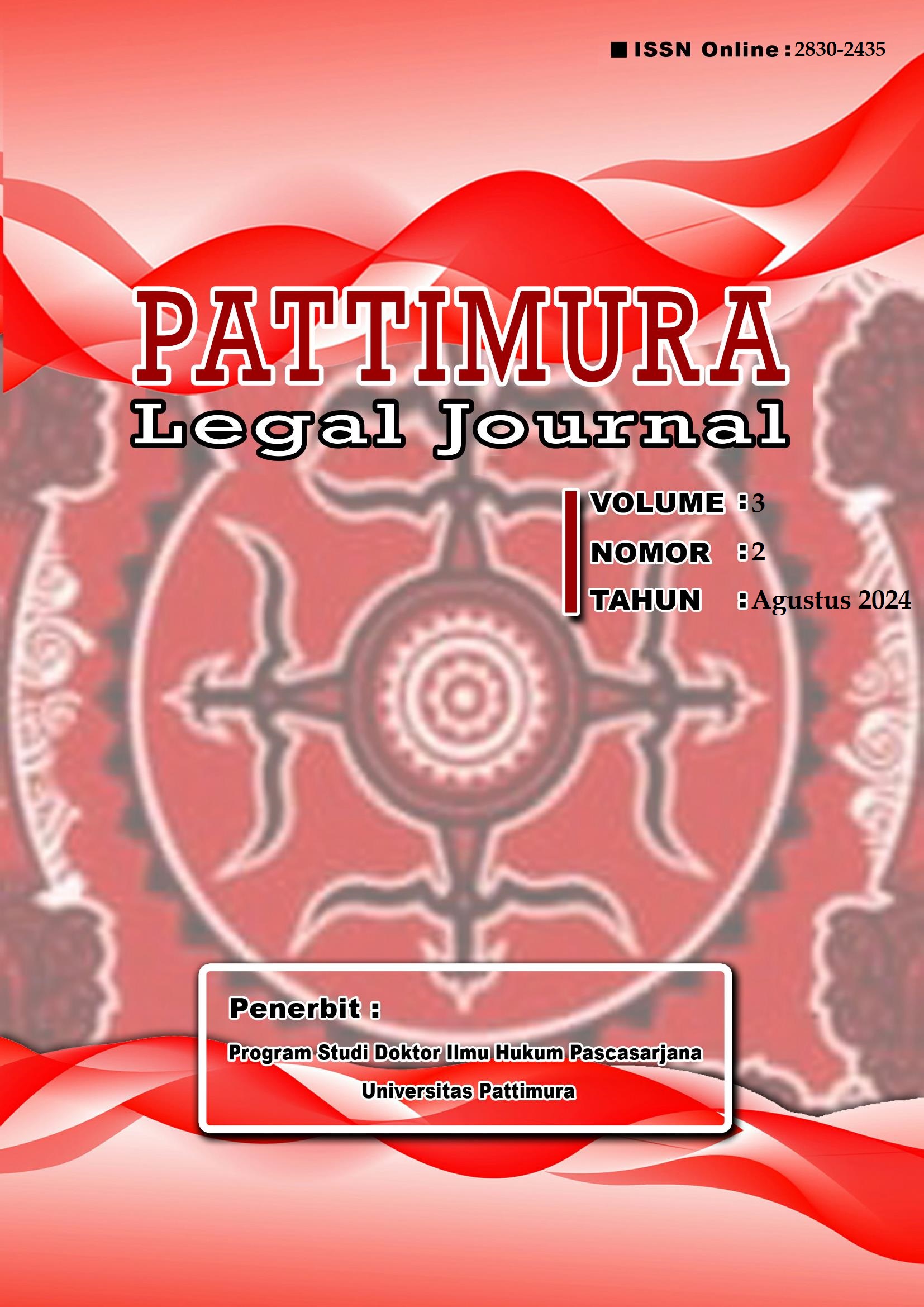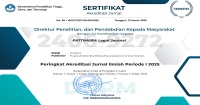Penerapan Basel Convention On Plastic Waste Amendments 2019 dalam Upaya Pengurangan Sampah Plastik Impor di Indonesia
Abstract
Introduction: The government has uncovered thousands of cases of smuggling of imported waste that violates regulations during the 2019-2022 period, these violations are in the form of waste that cannot be recycled and contains B3, this violates the provisions of the Basel Amendments 2019 based on attachments II, VIII and IX. The environmental damage caused by plastic waste is becoming increasingly serious, because apart from having to overcome existing waste problems, the government also has to face problems related to imported plastic waste.
Purposes of the Research: To find out the implementation of the Basel Convention on Plastic Waste Amendments 2019 in efforts to reduce imported plastic waste in Indonesia and to find out the impact of imported plastic waste and the efforts made to reduce imported plastic waste in Indonesia.
Methods of the Research: The research method used is a normative research method, namely legal research carried out by examining library materials or secondary data.
Results Originality of the Research: The implementation of the Basel Convention on Plastic Waste Amendments 2019 in efforts to reduce imported plastic waste in Indonesia appears to have not been able to be actualized optimally, due to a lack of supervision in its implementation, and there are still gaps that provide opportunities for imported plastic waste to enter Indonesia. The impact of imported waste that continues to enter Indonesia has the potential to damage the environment in Indonesia which will affect the quality of life of future generations. One step is to maximize efforts to sort and process waste, so that in the future we can significantly reduce dependence on imported plastic waste, so that the objectives of the principle of sustainable development can be implemented.
Downloads
References
Jurnal
Babayemi, Joshua O, Innocent C. Nnorom, Oladede Osibanjo and Roland Weber. “Ensuring sustainability in plastics use in Africa: consumption, waste generation, and projections.” Environmental Sciences Europe 31, no. 60 (2019): 1-20, https://doi.org/10.1186/s12302-019-0254-5.
Prasetiawan, Teddy. “Ancaman Impor Sampah Terhadap Indonesia.”Pusat Penelitian Info Singkat, Volume XI, No. 12/II/Puslit/Juni, (2019): 13-18.
Rafi, Paksi dan Meidyto Nafa Perkasa. “Dampak Kerusakan Terhadap Lingkungan yang Disebabkan oleh Sampah Plastik Berdasarkan Tinjauan UU No. 18 Tahun 2008.” Jurnal Multidisiplin Indonesia 2, no. 7 (2023): 1420-1425.
Luthan, Salman. “Masalah Sampah Plastik Impor dan Dampaknya Terhadap Lingkungan Hidup.” UNISIA, no. 30 (2016): 100-111, https://doi.org/10.20885/unisia.v0i30.5824.
Buku
Khan, Sabaa. “Clearly Hazardous, Obscurely Regulated: Lesson from the Basel Convention on Waste Trade.” Cambridge: Cambridge University Press, 2020.
Marzuki, Peter Mahmud. “Penelitian Hukum Edisi Revisi.” Jakarta: Kencana, 2013.
Pramudianto, Andreas, Hukum Perjanjian Lingkungan Internasional. Depok: Rajawali Pers, 2017.
Soekanto, Soerjono dan Sri Mamudji. “Penelitian Hukum Normatif: Suatu Tinjauan Singkat.” Depok: Rajawali Pers, 2018.
Wingfield, Susan dan Melisa Lim. “The United Nation Basel Conventions Global Plastic Waste Partnership: History, Evolution and Progress.” Amherst: Springer, 2021.
Online/World Wide Web, Skripsi, Tesis, Disertasi, Dan Lain-Lain
Alinea.id, Sampah Impor: Dibutuhkan indutri, mengancam kesehatan. Diakses melalui https://www.alinea.id/nasional/sampah-impor-dibutuhkan-indutri-mengancam-kesehatan-b2fka9DHI
Ardy, Muhammad Farhan. “Kebijakan Impor Limbah Plastik Indonesia Tahun 2018-2020.” Universitas Andalas, (2021).
Beth Gardiner, Indonesia Cracks Down on the Scourage of Imported Plastic Waste, 2023, https://e360.yale.edu/features/plastic-waste-imports-recycling-indonesia
Colifaturansa. “Kepatuhan Indonesia Terhadap Amandemen Konvensi Basel 2019 Terkait Impor Limbah Plastik.” Universitas Lampung, (2023).
https://enb.iisd.org/articles/basel-convention.
https://www.basel.int/Implementation/Plasticwaste/Amendments/FAQs/tabid/8427/Default.aspx.
Linna Amanda, Apakah Indonesia Akan Menjadi Tempat Pembuangan Akhir?, https://www.projectplanetid.com/post/is-indonesia-on-track-to-becoming-a-wasteland.
Media Indonesia, Status 1.008 Kontainer Sampah Belum Jelas. Diakses melalui https://mediaindonesia.com/read/detail/261244-status-1008-kontainer-sampahbelum-jelas.
Peta Perdagangan Sampah Plastik Indonesia 2022, Ke Mana Saja? (dataindonesia.id).
Te’dang, Gina Sonia. “Implementasi Konvensi Internasional Basel Terhadap Impor Sampah Di Tiongkok.” Universitas Bosowa, (2020).
Teori Monisme & Dualisme dalam Hukum Internasional, https://hukumexpert.com/teori-monisme-dualisme-dalam-hukum-internasional/?detail=ulasan#_ftnref6.
UNEP, Plastic and toxic additives, and the circular economy: the role of the Basel and Stockholm Conventions. (2019): 1-21.
Copyright (c) 2024 Aulan Nufus, Zulfikar Jayakusuma, Ledy Diana (Author)

This work is licensed under a Creative Commons Attribution-NonCommercial 4.0 International License.
Authors who publish their manuscripts in this Journal agree to the following conditions:
- The copyright in each article belongs to the author, as well as the right to patent.
- Authors are able to enter into separate, additional contractual arrangements for the non-exclusive distribution of the journal's published version of the work (e.g., post it to an institutional repository or publish it in a book), with an acknowledgment of its initial publication in this journal.
- Authors are permitted and encouraged to post their work online (e.g., in institutional repositories or on their website) prior to and during the submission process, as it can lead to productive exchanges, as well as earlier and greater citation of published work.
- Authors have the right to self-archiving of the article (Author Self-Archiving Policy)






















